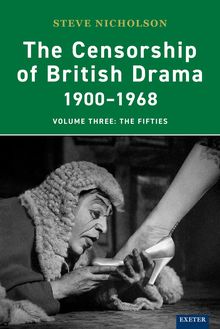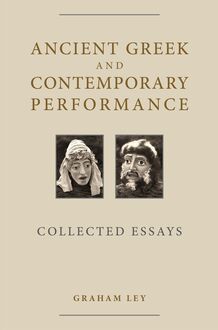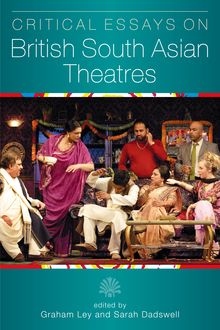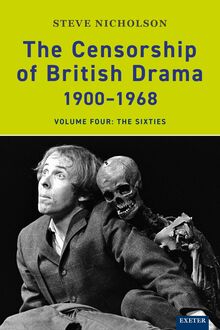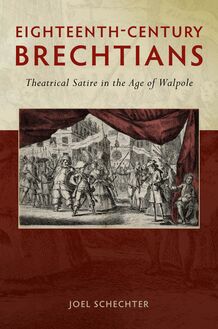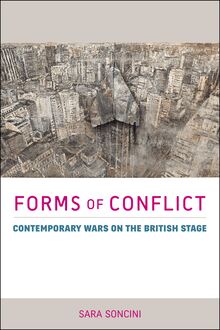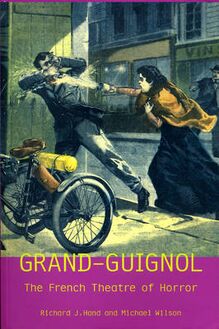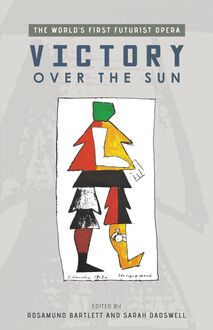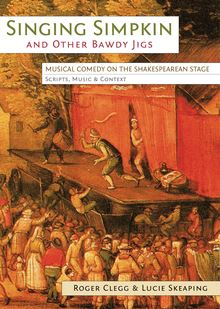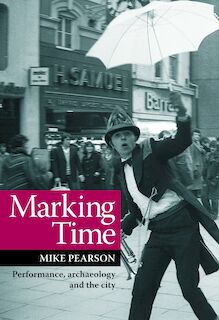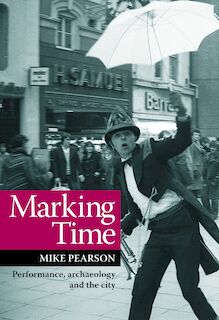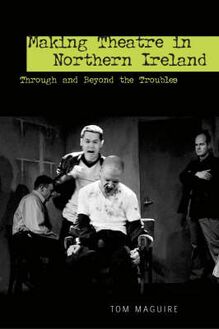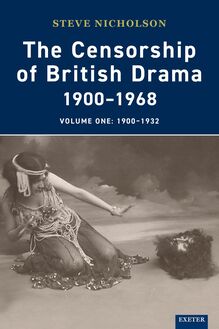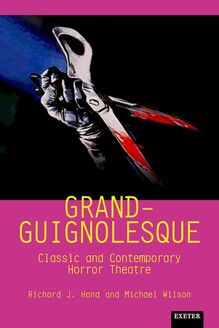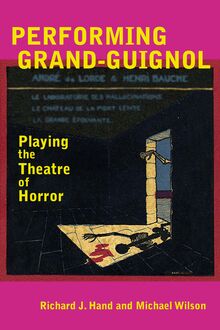-
 Univers
Univers
-
 Ebooks
Ebooks
-
 Livres audio
Livres audio
-
 Presse
Presse
-
 Podcasts
Podcasts
-
 BD
BD
-
 Documents
Documents
-
- Cours
- Révisions
- Ressources pédagogiques
- Sciences de l’éducation
- Manuels scolaires
- Langues
- Travaux de classe
- Annales de BEP
- Etudes supérieures
- Maternelle et primaire
- Fiches de lecture
- Orientation scolaire
- Méthodologie
- Corrigés de devoir
- Annales d’examens et concours
- Annales du bac
- Annales du brevet
- Rapports de stage
La lecture à portée de main
Découvre YouScribe en t'inscrivant gratuitement
Je m'inscrisThe Censorship of British Drama 1900-1968 Volume 3 , livre ebook
Découvre YouScribe en t'inscrivant gratuitement
Je m'inscrisEn savoir plus
En savoir plus

Description
This is the third volume in a new paperback edition of Steve Nicholson’s comprehensive four-volume analysis of British theatre censorship from 1900-1968, based on previously undocumented material in the Lord Chamberlain's Correspondence Archives in the British Library and the Royal Archives at Windsor. Focusing on plays we know, plays we have forgotten, and plays which were silenced for ever, Censorship of British Drama demonstrates the extent to which censorship shaped the theatre voices of this decade. The book charts the early struggles with Royal Court writers such as John Osborne and with Joan Littlewood and Theatre Workshop; the stand-offs with Samuel Beckett and with leading American dramatists; the Lord Chamberlain’s determination to keep homosexuality off the stage, which turned him into a laughing stock when he was unable to prevent a private theatre club in London's West End from staging a series of American plays he had banned, including Arthur Miller's A View from the Bridge and Tennessee Williams's Cat on a Hot Tin Roof; and the Lord Chamberlain’s attempts to persuade the government to give him new powers and to rewrite the law.
This new edition includes a contextualising timeline for those readers who are unfamiliar with the period, and a new preface.
DOI: https://doi.org/10.47788/SEEA6021
Acknowledgements
Introduction: 'That Happy State'
1. Censorship in a Golden Age
2. 'Packed with Nancies': Homosexuality and the Stage (I)
3. Breaking the Rules, Breaking the Lord Chamberlain: Unlicensed Plays in the West End
4. Speaking the Unspoken: Homosexuality and the Stage (II)
5. Not Always on Top: The Lord Chamberlain's Office and the New Wave
6. Dirty Business: Sex, Religion and International Politics
7. The Tearing Down of Everything: Class, Politics and Aunt Edna
Afterword
Biographies of the principal people working for the Lord Chamberlain's Office
Notes
Select Bibliography
Index
Sujets
LGBT
Europe
Royaume-Uni
Samuel Beckett
Tennessee Williams
Arthur Miller
Performance
History
John Osborne
General
Great Britain
Stephen Ireland
History of Europe
United Kingdom
20th century
1950s
Ireland
General officer
Theatre Workshop
History of the British Isles
Lord Chamberlain's Office
Post-war
Censorship
Theatre
Reino Unido
Años 1950
Histoire
POLITICAL SCIENCE
Theater
Social History
Business Aspects
Informations
| Publié par | University of Exeter Press |
| Date de parution | 02 mars 2015 |
| Nombre de lectures | 0 |
| EAN13 | 9780859899055 |
| Langue | English |
| Poids de l'ouvrage | 6 Mo |
Informations légales : prix de location à la page 0,0000€. Cette information est donnée uniquement à titre indicatif conformément à la législation en vigueur.
Extrait
The Censorship of British Drama 1900–1968
Volume Three: The Fifties
This is the third volume of Steve Nicholso’s an nalysis of British
theatre censorship from 1900 until 1968. The books are based
on previously undocumented material in the Lord Chamberlain’s
Correspondence Archives.
The book charts the early struggles with Royal Court writers
such as John Osborne and with Joan Littlewood and Theatre
Workshop; the stand ofs with Samuel Beckett and with leading
American dramatists; the Lord Chamberlain’s determination to keep
homosexuality of the stage, which turned him into a laughing stock
when he was unable to prevent a private theatre club in London’s
West End from staging a series of American plays he had banned,
including Arthur Miller’s A View from the Bridge and Tennessee
Williams’s Cat on a Hot Tin Roof; and the Lord Chamberlain’s
attempts to persuade the government to give him new powers and
to rewrite the law.
This defnitive survey has been expanded to four volumes: Volume
Three covers 1953–1960; a fourth volume will cover the period
1960–1968.
Steve Nicholson is Reader in Twentieth-Century and Contemporary
Theatre at the University of Shefeld and has published extensively
in the areas of politics and theatre in Britain in the twentieth century,
and of theatre censorship. He is the author of British Theatre and the
Red Peril: The Portrayal of Communism, 1917–1945 (UEP, 1999) and
is a series editor of Exeter Performance Studies.
Nicholson, Censorship of British Drama, Volume 3.indd 1 09/09/2011 10:21:27Exeter Performance Studies
Series editors: Peter Thomson, Professor of Drama at the University of Exeter;
Graham Ley, Professor of Drama and Theory at the University of Exeter; Steve
Nicholson, Reader in Twentieth-Century Contemporary Theatre at the University
of Shefeld.
From Mimesis to Interculturalism: Readings of Theatrical Theory Before and After
‘Modernism’
Graham Ley (1999)
British Theatre and the Red Peril: The Portrayal of Communism 1917–1945
Steve Nicholson (1999)
On Actors and Acting
Peter Thomson (2000)
Grand-Guignol: The French Theatre of Horror
Richard J. Hand and Michael Wilson (2002)
The Censorship of British Drama 1900–1968: Volume One 1900–1932
Steve Nicholson (2003)
The Censorship of British Drama 1900–1968: Volume Two 1933–1952
Steve Nicholson (2005)
Freedom’s Pioneer: John McGrath’s Work in Theatre, Film and Television
edited by David Bradby and Susanna Capon (2005)
John McGrath: Plays for England
selected and introduced by Nadine Holdsworth (2005)
Theatre Workshop: Joan Littlewood and the Making of Modern British Theatre
Robert Leach (2006)
Making Theatre in Northern Ireland: Through and Beyond the Troubles
Tom Maguire (2006)
“In Comes I”: Performance, Memory and Landscape
Mike Pearson (2006)
London’s Grand Guignol and the Theatre of Horror
Richard J Hand and Michael Wilson (2007)
Theatres of the Troubles: Theatre, Resistance and Liberation in Ireland
Bill McDonnell (2008)
Nicholson, Censorship of British Drama, Volume 3.indd 2 09/09/2011 10:21:27Previous volumes in Steve Nicholson’s survey of British theatre censorship
The Censorship of British Drama 1900–1968 Volume One, 1900–1932
2003 360 pp. isbn: 978 0 85989 638 2
The Censorship of British Drama 1900–1968 Volume Two, 1933–1952
2005 440pp. isbn: 978 0 85989 697 9
Forthcoming (2012)
The Censorship of British Drama 1900–1968 Volume Four, The Sixties
288pp approx. isbn: 978 0 85989 846 1
From the reviews of Volumes One and Two:
“… ofers a highly readable, intelligent, and good-humoured account of
the complex intersection of historical, political, social, and cultural forces
that infuenced censorship during this period. The writing is lively,
authoritative, and full of wonderful detail acquired during Nicholson’s
meticulous research into the Lord Chamberlain’s theatre and correspondence
archives …” Modern Drama
“Nicholson is very readable. He tells a good story, both chronologically
and in the many accounts of particular wrangles, campaigns, negotiations,
paradoxes and outrages. … he uses correspondence to give palpable life to
human agencies within institutional structures. … this is also both a work of
reference—it efciently points us to particular records—and a fne work of
synthesis and summary—Nicholson has done the legwork for a community
of scholars.” Theatre Research International
“Steve Nicholson’s heroic archival work has resulted in the extraordinary
and consistently rich detail contained within these two volumes. … Everyone
studying twentieth-century British theatre should have access to these
volumes, and Nicholson should be given an award for sifting so painstakingly
through the thousands of archive fles which document the archaic process
of censorship which held such power over what the public were permitted to
see in the theatre until 1968.” New Theatre Quarterly
Nicholson, Censorship of British Drama, Volume 3.indd 3 09/09/2011 10:21:27Nicholson, Censorship of British Drama, Volume 3.indd 4 09/09/2011 10:21:27The Censorship of British Drama
1900–1968
Volume Three: The Fifties
Steve Nicholson
Nicholson, Censorship of British Drama, Volume 3.indd 5 09/09/2011 10:21:27First published in 2011 by
University of Exeter Pres s
Reed Hall, Streatham Drive
Exeter EX4 4QR
UK
www.exeterpress.co.uk
© Steve Nicholson 2011
The right of Steve Nicholson to be identifed as author of t his
work has been asserted by him in accordance with
the Copyright, Designs and Patents Act 1988.
British Library Cataloguing in Publication Data
A catalogue record for this book is available
from the British Library
ISBN 978 0 85989 750 1
Typeset in Plantin by Carnegie Book Production, Lancaster
Printed in Great Britain by T. J. International, Padstow
Nicholson, Censorship of British Drama, Volume 3.indd 6 09/09/2011 10:21:28Contents
Acknowledgements ix
Introduction: ‘That Happy State’ 1
1 Censorship in a Golden Age 9
2 ‘Packed with Nancies’: Homosexuality and the Stage (I ) 52
3 Breaking the Rules, Breaking the Lord Chamberlain:
Unlicensed Plays in the West End 77
4 Speaking the Unspoken: Homosexuality and the Stage (II) 110
5 Not Always on Top: The Lord Chamberlain’s Ofce
and the New Wave 140
6 Dirty Business: Sex, Religion and International Politi cs 163
7 The Tearing Down of Everything: Class, Politics an d
Aunt Edna 189
Afterword 226
Biographies of the principal people working for t he
Lord Chamberlain’s Ofce 229
Notes 237
Select Bibliography 257
Index 260
Nicholson, Censorship of British Drama, Volume 3.indd 7 09/09/2011 10:21:28Nicholson, Censorship of British Drama, Volume 3.indd 8 09/09/2011 10:21:28Acknowledgements
I would like to thank the following for their support, assistance and co-ntri
butions to the research and the writing of this book:
The Arts and Humanities Research Council, whose grants were crucial in
allowing me time (and funds) to research and complete this book.
The Society for Theatre Research and the University of Shefeld, both
of whom also made generous grants to assist the process of research and
publication.
Kathryn Johnson, Curator of Modern Drama at the British Library and
an expert at navigating the Lord Chamberlain’s archives.
Staf in the Manuscript Room of the British Library and the Study Room
of the Theatre Museum.
Queen Elizabeth II for granting me permission to read and make use of
material in the Royal Archive at Windsor.
Staf in the Royal Archive, especially the Registrar, Miss Pamela Clark.
University of Exeter Press and its Editorial Board, especially Simon Baker,
Peter Thomson and Graham Ley.
And to Heather, Katya, Vikka and Pushkin.
Nicholson, Censorship of British Drama, Volume 3.indd 9 09/09/2011 10:21:28Nicholson, Censorship of British Drama, Volume 3.indd 10 09/09/2011 10:21:28INTRODUCTION
‘That Happy State’
In 1959, an undergraduate student at Cambridge University wrote to the
Lord Chamberlain’s Ofce requesting information about theatre censorship
for an article in a student magazine. He was particularly keen to know
whether there was a clear policy specifying exactly what was allowed and
what forbidden. In reply, Norman Gwatkin, the Assistant Comptroller at
St James’s Palace, told him that ‘any written code of rules or precedents
would be much too infexible an instrument of control’. Gwatkin had no
hesitation in revealing the principle of law through which the Ofce carried
out its duties:
The system followed by the Act is therefore to nominate as Censor
someone who, by reason of the other duties of his Ofce, may reasonably
be held to be experienced in the world, and to leave him to exercise his
unfettered judgment as to what would be harmful.
It is a personal censorship1.
While the Lord Chamberlain’s detractors were not being completely fair
when they claimed that his primary functions were organising Buckingham
Palace garden parties and looking after the Queen’s swans, it is still not
immediately apparent how his ‘other duties’ necessarily equipped him to
rule on what it was permissible to say and do on the public stage.
Of course, Gwatkin’s statement did not reveal the whole truth. Certainly
it was the Lord Chamberlain (at this time Roger Lumley, the eleventh
Earl of Scarbrough) who signed the licences and took responsibility for all
the decisions, and certainly his personal views—not to mention his tastes
and whims—were a signifcant factor. Yet Lords Chamberlain through the
twentieth century frequently sought advice from government ministers,
civil servants, foreign ambassadors, religious leaders, the police, medical
experts, members of the Royal Household, and anybody else whose opinion
they considered worth having. They also paid attention to the views of their
Examiners of Plays and other staf, and were never short of unsolicited
opinions from members of the public, MPs, journalists, theatre critics,
Nicholson, Censorship of Britis
-
 Univers
Univers
-
 Ebooks
Ebooks
-
 Livres audio
Livres audio
-
 Presse
Presse
-
 Podcasts
Podcasts
-
 BD
BD
-
 Documents
Documents
-
Jeunesse
-
Littérature
-
Ressources professionnelles
-
Santé et bien-être
-
Savoirs
-
Education
-
Loisirs et hobbies
-
Art, musique et cinéma
-
Actualité et débat de société
-
Jeunesse
-
Littérature
-
Ressources professionnelles
-
Santé et bien-être
-
Savoirs
-
Education
-
Loisirs et hobbies
-
Art, musique et cinéma
-
Actualité et débat de société
-
Actualités
-
Lifestyle
-
Presse jeunesse
-
Presse professionnelle
-
Pratique
-
Presse sportive
-
Presse internationale
-
Culture & Médias
-
Action et Aventures
-
Science-fiction et Fantasy
-
Société
-
Jeunesse
-
Littérature
-
Ressources professionnelles
-
Santé et bien-être
-
Savoirs
-
Education
-
Loisirs et hobbies
-
Art, musique et cinéma
-
Actualité et débat de société
- Cours
- Révisions
- Ressources pédagogiques
- Sciences de l’éducation
- Manuels scolaires
- Langues
- Travaux de classe
- Annales de BEP
- Etudes supérieures
- Maternelle et primaire
- Fiches de lecture
- Orientation scolaire
- Méthodologie
- Corrigés de devoir
- Annales d’examens et concours
- Annales du bac
- Annales du brevet
- Rapports de stage
